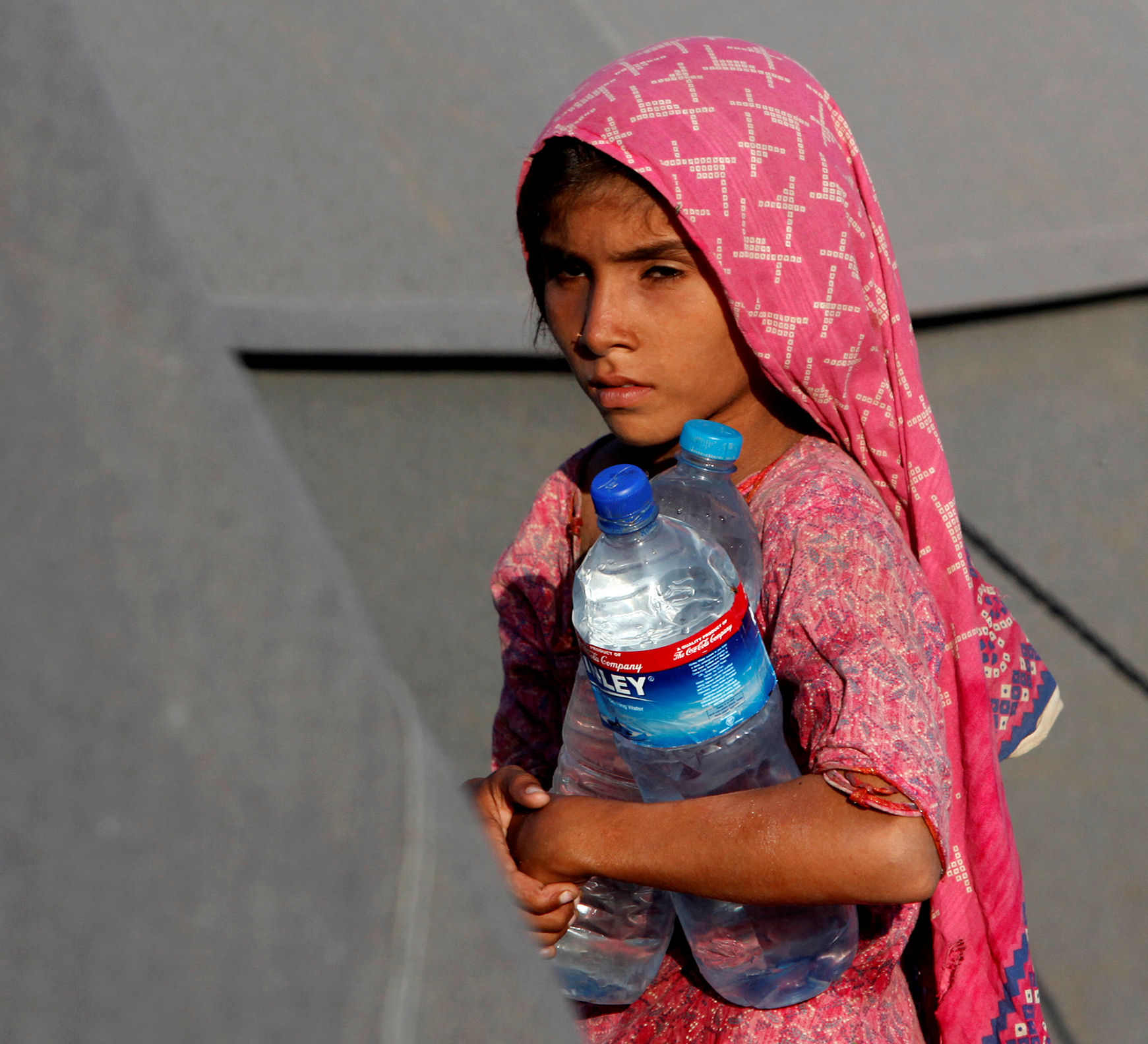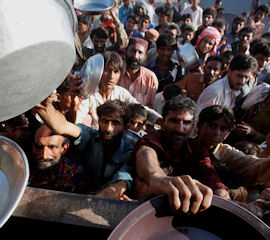Pakistan floods: 'epic and historic' disaster
Updated on 19 August 2010
The international community must stand with Pakistan in this "epic and historic" disaster, the US deputy special representative for the country tells Channel 4 News, as the UN steps up its efforts to secure aid for flood victims.

The United Nations (UN) originally estimated that two million people had been displaced by the deluge, but three weeks after the disaster first hit and as the water continues to wreak havoc, that number is now closer to four million.
The renewed figure is a stark reminder of the ongoing crisis in the country and the urgent need for aid funding and medical help.
Vikram Singh, US Deputy Special Representative for Afghanistan and Pakistan, spoke to Channel 4 News today and urged the international community to stand with Pakistan and continue to offer assistance, describing the floods as a disaster of "epic and historic proportions."
The situation
Over 20 million people are now receiving foreign aid in what the UN is calling Pakistan’s worst humanitarian crisis. Islamabad has confirmed 1,475 deaths, but World Health Organisation representative Guido Sabatinelli says the death toll could be much higher
The floods have been spreading and around a fifth of Pakistan is now underwater - that is an area larger than England. There are still hundreds of people out of reach; the floods wiped out entire villages, farmland and damaged infrastructure like roads and bridges.The UN aid body the Office for the Coordination of Humanitarian Affairs (OCHA) says more than 650,000 homeless families are still without basic shelter.

Aid appeal
The UN General Assembly will meet on Thursday in a bid to speed up the delivery of aid. So far just half of the $460m asked for has been raised.
US Secretary of State Hillary Clinton is expected to use the UN meeting to announce extra American aid -currently $90m, or nearly £58m.
The Asian Development Bank is reportedly ready to offer a $2bn emergency loan to repair the nation's damaged infrastructure and the World Bank has promised to lend $900m (£575m).
The Disasters Emergency Commission has announced that its appeal has raised £24m with member agencies so far reaching 700,000 people.
The DEC's Chief Executive Brendan Gormley said: "After two weeks, it is extraordinary that donations are still pouring in, showing that people continue to be moved by the unfolding disaster.
“The public has understood that this crisis is still growing in scale and requires ongoing support to make a real difference to the millions affected."
How to donate
To make a donation to the DEC Pakistan appeal call the 24 hour hotline on 0370 60 60 900, visit http://www.dec.org.uk or donate over the counter at any post office or high street bank, or send a cheque.
You can also donate £5 by texting the word GIVE to 70707.
US response
Mr Singh, US Deputy Special Representative for Afghanistan and Pakistan, outlined the US response to the disaster for Channel 4 News.
When asked about the legitimacy of the partners distributing aid he said: "Pakistan's disaster management capablities have really grown over the last five years. It is a challenge to all of Pakistans institutions and we are going to help them do the best they can.
"Right now all we can focus on is getting assistance out and we do it through a network of Pakistani official partners and through UN agencies. We have local partners we have worked with for decades - as have UK aid agencies like the Department for International Development (DfID). They are partners that we are very comfortable with and through whom we can get assistance where it needs to go."
When asked about the possible implications for the current government following the disaster, Mr Singh stated: "As we all know disasters have political ramifications whenever they strike any society and we are going to be helping the Pakistani authorities and institutions do the best they can to meet the challenge that they face right now. We will work to help the government and people, work with the state and the Pakistani nation for the long term no matter where anything goes."
He added: "It is no secret that US popularity in Pakistan has always been a challenge and we hope the people will come to see the US as a friend and partner for the long term - that is a core element in our overall goals in Pakistan.
"We are responding to this as humanitarian disaster. In the long term there is absolutely no other intention other than a long term meaningful partnership. Building trust takes time and over time I think the Pakistani people, the government and the nation of Pakistan will only increase the ties to the US; we are going to continue making a lot of progress."
Relief camps
UN Secretary General Ban Ki-moon will speak about the humanitarian situation at the UN meeting. He described the situation as "heart-wrenching" after visiting the blighted region at the weekend.
At camps for the displaced across the country, survivors are battling with crippling heat, miserable sanitation and swarms of mosquitoes.
Medical Emergency Relief International (Merlin) is delivering aid to three of the worst affected areas, Swat, Buner and Nowshera, home to to over one million people. Some medical teams are having to walk over six hours a day in the poor weather conditions to reach survivors left stranded by landslides and continuing rain.
Dr Ahreema told Channel 4 News: "The main concern we have is a cholera outbreak. It's still monsoon season and the conditions are ripe for cholera. We have also been hearing reports of some cases of malaria which is of great concern.
"In the long term we are very concerned about malnutrition, especially among the vulnerable, like women and children. The people here are depressed. Many are very far from home. In these districts most of the houses are made of mud so many peoples’ homes have been washed away and they have nothing to go back to."
An aid worker's view
"The situation in the camps is very bad. The sanitary conditions are poor; people are living very close together and there is no clean drinking water. Merlin is giving out water purification tablets so at least people can drink. But it’s not looking good.
"The main concern we have is a cholera outbreak. It's still monsoon season and the conditions are ripe for cholera. We have also been hearing reports of some cases of malaria which is of great concern. In the long term we are very concerned about malnutrition, especially among the vulnerable, like women and children
"Acute water diarrhoea is affecting around 20 per cent of the people we see, and its rising fast. As we go into winter we will be expecting more respiratory tract infections, already 21 per cent of our patients are suffering from these, and another 19 per cent have skin complaints. At the camp we can treat people but also refer them to hospital if required.
"We’re setting up three Diarrhoea Treatment Units capable of treating 300 patients at any one time for acute watery diarrhoea which can prove fatal within hours if left untreated.
"We are not short of supplies but more people are arriving every day and we may well run out. Some of our teams are having to trek 6 or 7 hours carrying medical supplies in order to reach those affected in more remote areas.
"With so many people affected it is going to take a very long time to help them."
Dr Ahreema is working with the medical relief agency MERLIN in Pakistan
Children at risk
And there are other fears. UN Spokesman Maurizio Giuliano has expressed concern about the safety of children in the wake of the disaster.
"You may have families who take drastic measures because they need to survive. So even though we don't have any suggestion that it is happening already, this can be a concern."
Save the Children told Channel 4 News: "In the days and weeks after a natural disaster children face huge risks to their safety. We've seen in previous disasters, like the tsunami, how increased numbers of children are trafficked as communities are disrupted and displaced, and families struggle to survive.
"Traffickers prey on children who have become separated from their families, while some parents are so desperate they hand their children over to strangers in the hope that they will reach safety outside the disaster zone.
"This is why it is so important that protecting children is put at the heart of any response to a natural disaster."
The Taliban
And amidst all of this Pakistani police are warning that the Taliban are taking advantage of the crisis to carry out more attacks. Overnight Taliban fighters ambushed police in the devastated north-west districts.
Peshawar police chief Liaqat Ali Khan said: "As the police force is busy in rescue and relief work for flood affectees, militants tried to take advantage of the situation to attack Peshawar – but we were fully alert and vigilant."
The mountainous north-west where a monsoon deluge first sparked the floods, is the centre of Pakistan's fight against al-Qaeda and Taliban militants, who use the porous border with Afghanistan to hide from and ambush Pakistani and Nato troops.
Around 60,000 troops are dealing with flood relief when they would normally be deployed in the fight against the Taliban.
There are reports that the Taliban is urging citizens to reject foreign aid, saying it would be stolen by the nation's political elite.



